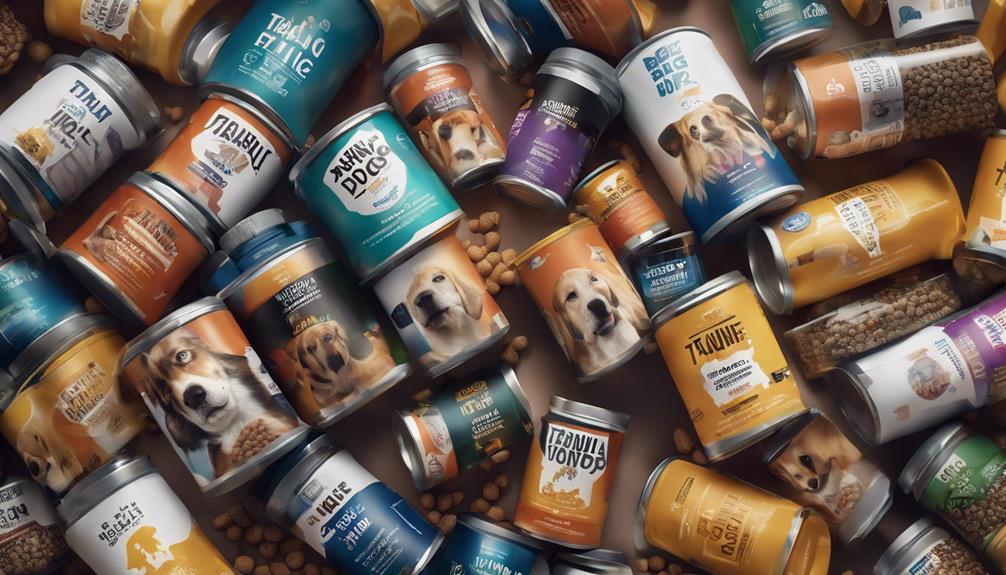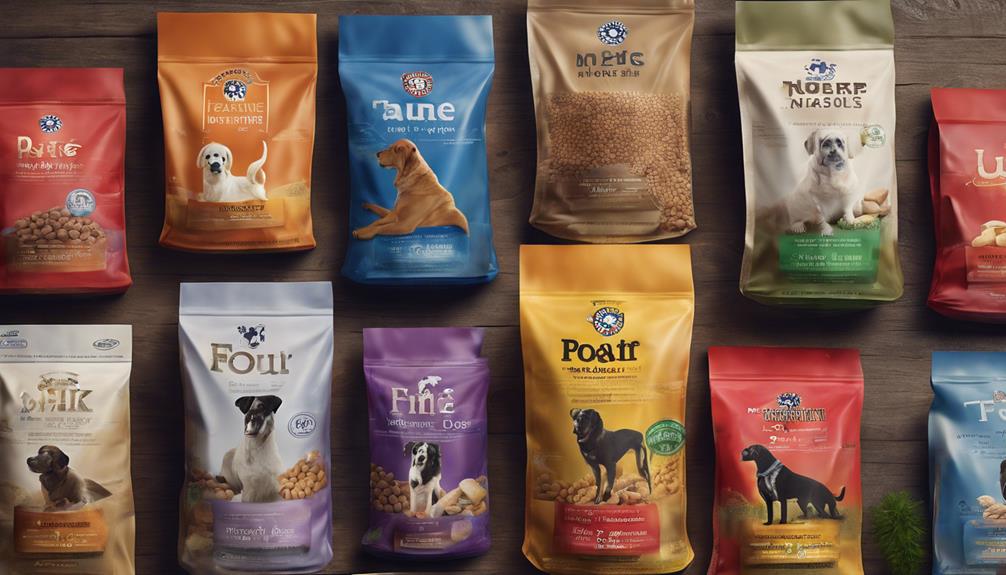In the realm of canine nutrition, the inclusion of taurine supplements in dogs' diets has garnered attention for its potential impact on their overall health.
As pet owners navigate the landscape of nutritional choices for their furry companions, understanding the nuances of taurine supplementation emerges as a critical factor.
From unraveling the intricacies of taurine's role in canine well-being to deciphering the implications of its deficiency, a closer look at taurine supplements for dogs unveils a world of considerations that go beyond the surface.
Key Takeaways
- Taurine supplementation is generally unnecessary with a balanced diet.
- Consult a vet before considering taurine supplements for dogs.
- High-quality commercial dog food ensures adequate taurine levels.
- Prevent taurine deficiency in dogs with evidence-based diets and vet guidance.
Importance of Taurine in Dogs' Diet
Why is taurine considered an essential component of a dog's diet?
Taurine, an indispensable amino acid for dogs, plays a crucial role in various bodily functions. While dogs can synthesize taurine if their diet is well-rounded, certain breeds or individual variations may require additional taurine intake.
High-quality dog food that is based on scientific evidence typically contains adequate taurine levels. Taurine deficiency can lead to serious health issues like Dilated Cardiomyopathy (DCM), underscoring the importance of ensuring proper taurine intake for dogs.
Consulting a veterinarian regarding the taurine needs of your pet is recommended to maintain their overall health and well-being.
Safety and Dosage of Taurine
When considering taurine supplementation for dogs, it is crucial to consult with a veterinarian to determine the appropriate dosage for your pet's specific needs. Taurine is generally safe for dogs, but proper dosing is essential to avoid any potential issues. Here are some key points to consider regarding the safety and dosage of taurine for dogs:
- Overdosing on taurine is unlikely due to the body's ability to break down excess amounts.
- Avoid supplementing taurine in growing puppies and kittens.
- Taurine has a high safe upper limit and is non-toxic.
- No known side effects of taurine have been reported in dogs or cats.
- Consult a vet to determine the correct taurine dose for your pets.
Sources of Taurine for Dogs

A variety of meat proteins such as beef, poultry, fish, pork, and eggs are abundant sources of taurine for dogs in their diet. These natural sources of taurine play a crucial role in maintaining your dog's overall health and well-being.
Commercial dog foods that carry the AAFCO label also ensure adequate levels of taurine to meet your pet's dietary requirements. It's important to note that dogs typically do not require additional taurine if they are being fed a complete and balanced diet.
Taurine can be naturally synthesized by your dog's body from these food sources, emphasizing the importance of providing high-quality nutrition to your canine companion. Be vigilant in checking dog food labels to confirm the nutritional completeness, including taurine content, to support your dog's optimal health.
Prevention of Taurine Deficiency
To avert taurine deficiency in dogs, ensuring their diet includes adequate levels of this essential amino acid is paramount for maintaining their overall health and well-being.
- Feed dogs high-quality, complete, and balanced diets rich in meat proteins.
- Choose commercial dog foods with AAFCO labels to guarantee sufficient taurine levels.
- Consult a veterinarian to address breed-specific risks of taurine deficiency.
- Regularly monitor dogs, especially those prone to taurine deficiency-related Dilated Cardiomyopathy (DCM).
- Avoid introducing new supplements without veterinary approval to prevent nutrient imbalances.
Taurine Supplementation Considerations

Considering the potential benefits and risks, what factors should be evaluated before deciding to supplement a dog's diet with taurine?
When contemplating taurine supplementation for dogs, it is crucial to assess the current diet quality. A well-balanced diet that meets the dog's nutritional needs may already provide sufficient taurine, making supplementation unnecessary. Consulting a veterinarian is paramount to determine if taurine supplementation is warranted based on the dog's specific health requirements.
Additionally, the dog's age, breed, and any existing health conditions should be considered before introducing taurine supplements. Monitoring the dog's response to the supplementation and adjusting the dosage under veterinary guidance is essential to prevent potential imbalances or adverse effects.
Taurine Overdose and Toxicity
When contemplating the use of taurine supplements for dogs, understanding the potential risks associated with taurine overdose and toxicity is essential. Taurine overdose can have adverse effects on dogs' health, despite its importance in their diet. Here are some key points to consider:
- Excessive taurine supplementation can lead to imbalances in the body.
- Symptoms of taurine toxicity may include gastrointestinal upset.
- High doses of taurine can potentially affect heart function.
- Regular monitoring of taurine levels is crucial when supplementing.
- Consult a veterinarian immediately if any signs of taurine overdose are observed.
Taurine for Growing Puppies and Kittens

In the nutritional care of growing puppies and kittens, the role of taurine as an essential amino acid warrants careful attention and consideration. Taurine plays a crucial role in their development, particularly in vision and heart health.
While adult dogs can synthesize taurine from a balanced diet, puppies and kittens have higher requirements during their growth stages. Adequate taurine levels are essential for proper growth, brain development, and overall well-being.
It is advisable to provide young animals with diets rich in taurine through high-quality commercial pet foods or natural sources like meat proteins. Consultation with a veterinarian is recommended to ensure that the specific nutritional needs of growing puppies and kittens are met for optimal health outcomes.
Taurine and Dilated Cardiomyopathy (DCM)
The correlation between taurine levels and the development of Dilated Cardiomyopathy (DCM) in dogs underscores the importance of understanding the role of this essential amino acid in canine cardiac health.
- DCM is a heart condition that can lead to heart failure in dogs.
- Taurine deficiency has been associated with an increased risk of DCM.
- Breeds like Cocker Spaniels, Golden Retrievers, and Newfoundlands are predisposed to DCM.
- Monitoring taurine levels in at-risk breeds is crucial.
- Consult a vet if concerned about taurine levels or DCM symptoms in your dog.
Taurine in Commercial Dog Food

Understanding the taurine content in commercial dog food is essential for ensuring the nutritional adequacy of your pet's diet.
High-quality commercial dog foods, especially those with an AAFCO label, are formulated to meet the taurine requirements of dogs. These foods typically contain ingredients rich in taurine, such as meat proteins like beef, poultry, fish, pork, and eggs.
When selecting a commercial dog food, it is important to check the label for taurine levels to ensure that your pet's dietary needs are being met. Providing a well-balanced, complete diet from reputable brands can help prevent taurine deficiencies and related health issues like Dilated Cardiomyopathy (DCM).
Consult a veterinarian for guidance on choosing the best commercial dog food for your pet's specific needs.
Taurine Synthesis in Dogs
Taurine synthesis in dogs primarily occurs through the enzymatic conversion of cysteine and methionine in their bodies. This process is essential for ensuring that dogs have an adequate supply of taurine, an important amino acid for various biological functions. To understand taurine synthesis better, consider the following key points:
- Enzymatic conversion of cysteine and methionine is the primary pathway for taurine synthesis in dogs.
- Taurine plays a crucial role in heart health, vision, and reproductive function in canines.
- Factors like breed, age, and health status can influence the efficiency of taurine synthesis.
- A well-balanced diet rich in animal proteins supports natural taurine production.
- Monitoring taurine levels in dogs, especially in at-risk breeds, is vital for preventing deficiencies.
Taurine Deficiency in Specific Breeds

Specific dog breeds, such as golden retrievers, have been notably associated with increased susceptibility to taurine deficiency-related Dilated Cardiomyopathy (DCM). Breeds like Cocker Spaniels, Newfoundlands, and certain large and giant breeds are also at higher risk. Research suggests that these breeds may have genetic factors that affect their taurine metabolism or have dietary preferences that lead to taurine deficiency.
Regular monitoring of taurine levels and cardiac health is crucial for these at-risk breeds to prevent DCM. Working closely with a veterinarian to tailor the diet and potentially supplementing with taurine can help mitigate the risks associated with taurine deficiency and DCM in these specific breeds.
Conclusion
In conclusion, understanding the importance of taurine in dogs' diets, the safety considerations, appropriate dosage, and sources of taurine is crucial for ensuring optimal health and well-being for our canine companions.
By being aware of the implications of taurine deficiency, pet owners can make informed decisions about taurine supplementation to prevent potential health issues such as dilated cardiomyopathy.
It is essential to consider these factors to promote the overall health of our beloved pets.




